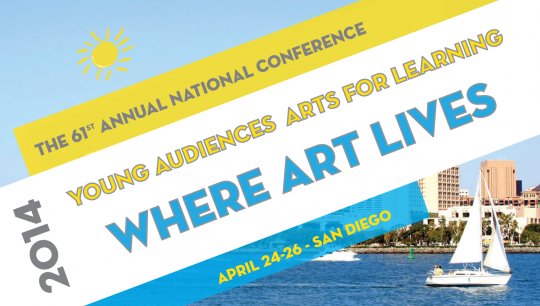
 Alfie Kohn: Keynote Address on Thursday, April 24 at 9 am
Alfie Kohn: Keynote Address on Thursday, April 24 at 9 amYA: Persistence and grit are the fundamental building blocks to the exploration of art an art making. However, your most recent Washington Post article, The Downside of "Grit": What Really Happens When Kids Are Pushed to Be More Persistent? suggests that these qualities can be misinterpreted and misunderstood?

YA: There is substantial evidence that students who are English Language Learners and students from low income families benefit greatly from arts education. Do you plan on expanding or creating a special curriculum that provides more arts education opportunities for the San Diego Unified community?
CM: We have been fortunate in San Diego Unified to have a Board of Education that has continued to place a priority on arts education for our students. Even during the most drastic budget cut years, our arts programs have continued to be in place. When the Board created the district’s Vision 2020, a road map for how the district will create quality schools in every neighborhood over the next 20 years, providing students with access to a Broad and Challenging Curriculum was at the top of the list. Our award-winning, nationally recognized Visual and Performing Arts (VAPA) Department is a model for arts programs across the country. The program follows the state standards and provides a balanced, comprehensive arts program that makes sure the arts are studied as discrete disciplines related to each other and, when appropriate, to other subject areas in the curriculum. Students in a comprehensive program are expected to master the content of an arts discipline. Our arts disciplines include dance, music, theater, and visual arts. As funding returns to school districts, I am confident our arts programs will continue to grow and thrive in San Diego Unified. A fact that not only benefits students who are English Language Learners or from low income families but all children.
YA: In an interview with Voice of San Diego, you were quoted saying that student assessment data is a “flashlight to show the way,” but “soft skills, the silent curriculum, matter as much, if not more.” How do you think these soft skills relate to arts education and how can they be best developed?
CM: Soft skills refer to the important characteristics that students must learn in order to be successful beyond the classroom. Kindness, collaboration, teamwork, empathy are all qualities that fall in the category of soft skills. The arts are a dynamic presence in our daily lives, enabling us to express our creativity while challenging our intellect. Through the arts, children have a unique means of expression that captures their passions and emotions and allows them to explore ideas, subject matter, and culture in delightfully different ways. Achievement in the arts cultivates essential skills, such as problem solving, creative thinking, effective planning, time management, teamwork, effective communication, and an understanding of technology.
California Lt. Governor Gavin Newsome recently said, “An arts education helps build academic skills and increase academic performance, while also providing alternative opportunities to reward the skills of children who learn differently.”


